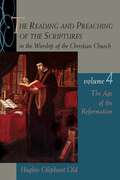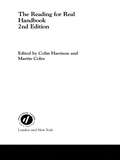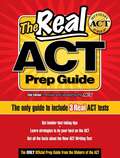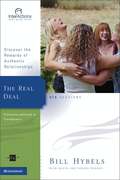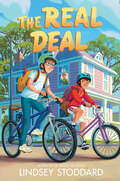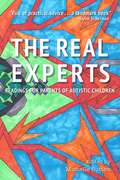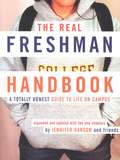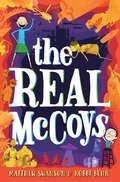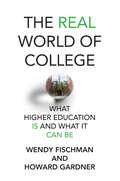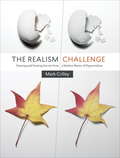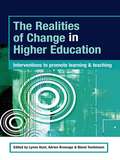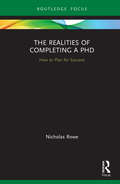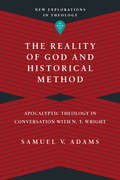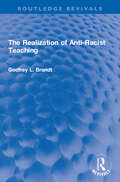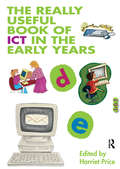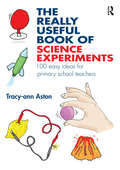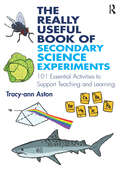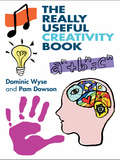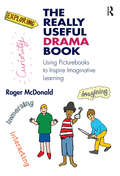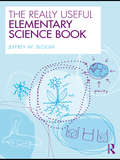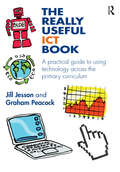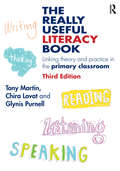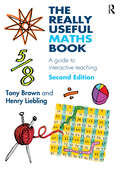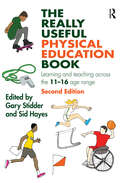- Table View
- List View
The Reading and Preaching of the Scriptures in the Worship of the Christian Church, Volume 4: The Age of the Reformation
by Hughes Oliphant OldThe Reading and Preaching of the Scriptures in the Worship of the Christian Church is a multivolume study by Hughes Oliphant Old that explores the history of preaching from the words of Moses at Mount Sinai through modern times. In Volume 4, The Age of the Reformation, Old focuses on changes in preaching due to the Protestant Reformation and the Catholic Counter-Reformation. This is the pivotal volume in Old's project, covering as it does not only what the Reformers and Counter-Reformers preached but also their reform of preaching itself. Old traces the main events and people involved in the development of preaching at this time -- Luther, Calvin, Thomas of Villanova, Francis Xavier, William Perkins, John Donne, Johann Gerhard, Jacques Bossuet, and many more -- while also giving due attention to how preaching was itself an act of worship.
The Reading for Real Handbook
by Colin Harrison Martin ColesThe Reading for Real Handbook was very well received by both teachers and literacy specialists when it was published in 1992. Since its first publication there have been significant changes in the field of 'reading', not least of which has been governmental demands for higher standards in reading and the resultant National Literacy Strategy (NLS).As well as providing invaluable help for teachers struggling with the National Literacy Strategy and the Literacy Hour, several other new topics of interest are also addressed, including teaching fiction/non-fiction inside and outside the Literacy Hour, integrating reading, writing and spelling work, involving parents, assessment and working with slower readers.
The Real Act Prep Guide: The Only Official Prep Guide From The Makers Of The Act
by Peterson'S Magazine Staff Act Inc. Staff Wallie W. HammondThe Real ACT Prep Guide is the only book with insider test-taking tips and strategy, practice, and insight from the makers of the ACT.
The Real Deal
by Bill Hybels Kevin HarneyThe path to satisfying relationships is clear. And rarely taken. We all long for close relationships. Bonds so secure that we can be completely honest and vulnerable. But often, we keep our relationships at a safe—and shallow—level. We avoid the risk of revealing all that’s in our hearts. God wants us to take that risk. His reward for doing so is the satisfaction of true, deep community. If you’re ready to experience that joy, The Real Deal will help you move beyond your fears into the realm of knowing others and being known by them. Each session will carefully assist you in peeling away the disguises that prevent you from being your truest, freest self. Get ready for a life-changing adventure in developing richer, more meaningful relationships with God, with others, and with yourself. Interactions—a powerful and challenging tool for building deep relationships between you and your group members, and you and God. Interactions is far more than another group Bible study. It's a cutting-edge series designed to help small group participants develop into fully devoted followers of Christ.
The Real Deal
by Lindsey Stoddard“An absolute treasure. Vibrant, charming, and absolutely real.”—Olugbemisola Rhuday-Perkovich, author of Operation SisterhoodTwo best friends discover the danger and power of secrets in this pitch perfect standalone from the acclaimed author of Just Like Jackie and Brave Like That.Not every friendship can be the real deal, but for Gabe and Oliver, that’s never been a question.Until now. Things still feel the same on the surface—they’re even making a comic about their friendship—but lately Oliver’s acting like he might be hiding something.And then there’s Reuben, the new boy who just moved to town. He doesn’t talk—not ever. The other kids say mean things and call him names behind his back. Gabe knows it isn’t right—but he and Oliver stay quiet, or worse, laugh along with the others just to keep from standing out.Through the character he and Oliver create in their comic adventure, the experience they have babysitting twin toddlers, and with the help of a troublemaking seventh grader who gets sent to their sixth-grade class, Gabe begins to find his voice and become the realest-deal version of his own self. But if he does that—can he still hold onto his best friend, too?Perfect for fans of Lisa Graff and Linda Mullaly Hunt, this novel from Lindsey Stoddard, whose stories were lauded as “remarkable” by the New York Times Book Review, will have fans new and old hooked.
The Real Experts: Readings for Parents of Autistic Children
by Michelle SuttonListening to the insights and experiences shared by autistic bloggers has helped Michelle Sutton to help her two autistic children to thrive. Now, Michelle has collected writings from a dozen autistic authors. The result is an extraordinary resource for families with autistic children, and also for educators, therapists, and other professionals.
The Real Freshman Handbook: A Totally Honest Guide To Life On Campus
by Jennifer HansonGeared to equip students for the front lines of the college experience, The College Handbook is a funny and insightful manual on everything a freshman needs to know to make the transition from high school to college, from home life to dorm life. From filling out the dreaded roommate questionnaire and choosing courses to studying for exams, writing papers, doing laundry, and surviving the social scene, Jennifer Hanson covers it all with a sense of humor and an insider's eye toward what really matters and works at college. Full of practical tips and funny anecdotal proof of their value, The College Handbook will quickly become every freshman's bible.
The Real McCoys
by Matthew Swanson; Robbi BehrElementary-school detective Moxie McCoy looks for a missing school mascot and a new best friend, with the help of her annoying little brother.
The Real World of College: What Higher Education Is and What It Can Be
by Howard Gardner Wendy FischmanWhy higher education in the United States has lost its way, and how universities and colleges can focus sharply on their core mission.For The Real World of College, Wendy Fischman and Howard Gardner analyzed in-depth interviews with more than 2,000 students, alumni, faculty, administrators, parents, trustees, and others, which were conducted at ten institutions ranging from highly selective liberal arts colleges to less-selective state schools. What they found challenged characterizations in the media: students are not preoccupied by political correctness, free speech, or even the cost of college. They are most concerned about their GPA and their resumes; they see jobs and earning potential as more important than learning. Many say they face mental health challenges, fear that they don&’t belong, and feel a deep sense of alienation. Given this daily reality for students, has higher education lost its way? Fischman and Gardner contend that US universities and colleges must focus sharply on their core educational mission. Fischman and Gardner, both recognized authorities on education and learning, argue that higher education in the United States has lost sight of its principal reason for existing: not vocational training, not the provision of campus amenities, but to increase what Fischman and Gardner call &“higher education capital&”—to help students think well and broadly, express themselves clearly, explore new areas, and be open to possible transformations. Fischman and Gardner offer cogent recommendations for how every college can become a community of learners who are open to change as thinkers, citizens, and human beings.
The Realism Challenge
by Mark CrilleyA captivating, step-by-step guide that teaches artists to draw and paint exact duplicates of common objects, rendered in the trompe l'oeil, hyperrealistic style of artist Mark Crilley's popular YouTube video series. Are You Up to the Challenge? With just watercolors, colored pencils, and white gouache, artist Mark Crilley takes you step-by-step through his process for producing stunning, hyperrealistic recreations of everyday items. Based on Crilley's mega-popular "Realism Challenge" YouTube videos, The Realism Challenge contains thirty lessons demonstrating how to render mirror-like duplicates in the trompe l'oeil tradition of everything from shells, leaves, and candy bars to your very own still life arrangements. Each lesson builds off the previous one, as you'll master essential artistic techniques like creating drop shadows, adding highlights, and building from light to dark. Learn the secrets of one of hyperrealism's biggest stars. Come take . . . The Realism Challenge!From the Trade Paperback edition.n master in order to conquer The Realism Challenge.
The Realities of Change in Higher Education: Interventions to Promote Learning and Teaching (SEDA Series)
by Lynne Hunt Adrian Bromage Bland TomkinsonThe Realities of Change in Higher Education explores the theory and practice of the everyday reality of change to promote learning and teaching in universities. Drawing on international case studies, it analyses a range of practical strategies to promote change that enhance students’ learning. Structured to flow from analysis of policy level change through to small-scale change at curriculum level, experienced practitioners consider key topics including: national policies and strategies different leadership styles the advancement of teaching and learning through research and scholarship how communities of practice may be effective agents for change in higher education the relationship between technology and change student assessment as a strategic tool for enhancing teaching and learning. With practical advice to enhance the learning experience of increasing numbers of university students, this book will appeal to all practitioners involved in improving learning and teaching outcomes in higher education.
The Realities of Completing a PhD: How to Plan for Success (Routledge Research in Education)
by Nicholas RoweThe Realities of Completing a PhD gives a balanced and evidence-based view of the realities of PhD life. Full of practical tips and including a checklist to complete before sending an application, the book helps prospective PhD students prepare for the realities of taking on a PhD from an informed basis and offers guidance on submitting a well-planned application. This is the first book of its kind to bring together a range of international data that helps to paint a more balanced picture of the PhD process. The book outlines different types of PhD, how to select a topic for a PhD, how to write a robust research proposal and application, and the realities of PhD study in relation to student wellbeing, social commitments and employment prospects. By considering the issues raised in this book, students are less likely to be overwhelmed by the PhD process, and better equipped to complete their award. The book will be invaluable for potential doctoral students as well as those already embarking on a PhD. It will also enable university mentors and supervisors to consider how the application phase is key to managing student expectations, and how they can further promote a healthy and productive PhD experience.
The Reality of God and Historical Method: Apocalyptic Theology in Conversation with N. T. Wright (New Explorations in Theology)
by Samuel V. AdamsAfter a flurry of heated debates in the mid-twentieth century over the relationship between faith and history, the dust seems to have settled. The parties have long since dispersed into their separate camps. The positions are entrenched and loyalties are staked out. This first volume in the New Explorations in Theology is a deliberate attempt to kick up the dust again, but this time as a constructive development of what is now being called "apocalyptic theology." Samuel Adams argues that any historiography interested in contributing to theological knowledge must take into consideration, at a methodological level, the reality of God that has invaded history in Jesus Christ. He explores this idea in critical dialogue with the writings of New Testament historian and theologian N. T. Wright, whose work has significantly shaped the current conversation on this problem. The Reality of God and Historical Method is a fresh, bold and interdisciplinary exploration of the question: How is it possible to say that a particular historical person is the reconciliation of the world?
The Realization of Anti-Racist Teaching (Routledge Revivals)
by Godfrey L. BrandtFirst published in 1986, The Realization of Anti-Racist Teaching explores the subject and importance of anti-racist education. The book examines the relationship between the educational debate at the level of academic institutions, professional organisations, and local education authorities within the context of the actual practice of teaching. It also questions how to link anti-racist theories put forward by theorists and activists to the practice of teachers. The Realization of Anti-Racist Teaching is a detailed discussion of the history of racism and of anti-racist teaching and education.
The Really Useful Book of ICT in the Early Years (The Really Useful)
by Harriet PricePractitioners and students wishing to know how very young children develop an awareness of ICT will find this text invaluable. ICT has arguably one of the biggest impacts on every-day 21st century life, so its inclusion in the Early Years Foundation Stage curriculum reflects the need to encourage forward-looking practice in classrooms and nurseries. This book enables you to help young children develop their knowledge, understanding and skill in the use of ICT, with chapters from contributors with a wide range of practical experience. Full of ideas and new thinking, this practical guide shows you how to: promote independence in children's use of ICT through resources like digital cameras and role-play toys. explore the nature of creativity through ICT, using it to support the more traditional areas of art, music, dance and writing use ICT to enhance the physical and sensory aspects of outdoor learning experiences. harness the potential of ICT in reaching children with a variety of different learning needs, particularly those with profound and multiple learning difficulties, or autistic spectrum disorders. value children's home experiences of ICT and build on what they already know, and how to work with parents in developing their child's ICT capability. ICT can underpin all areas of learning for young children; this highly practical, inspirational and informative text is therefore relevant to all practitioners and students training in Early Years education.
The Really Useful Book of Science Experiments: 100 easy ideas for primary school teachers (The Really Useful)
by Tracy-ann AstonThe Really Useful Book of Science Experiments contains 100 simple-to-do science experiments that can be confidently carried out by any teacher in a primary school classroom with minimal (or no!) specialist equipment needed. The experiments in this book are broken down into easily manageable sections including: It’s alive: experiments that explore our living world, including the human body, plants, ecology and disease A material world: experiments that explore the materials that make up our world and their properties, including metals, acids and alkalis, water and elements Let’s get physical: experiments that explore physics concepts and their applications in our world, including electricity, space, engineering and construction Something a bit different: experiments that explore interesting and unusual science areas, including forensic science, marine biology and volcanology. Each experiment is accompanied by a ‘subject knowledge guide’, filling you in on the key science concepts behind the experiment. There are also suggestions for how to adapt each experiment to increase or decrease the challenge. The text does not assume a scientific background, making it incredibly accessible, and links to the new National Curriculum programme of study allow easy connections to be made to relevant learning goals. This book is an essential text for any primary school teacher, training teacher or classroom assistant looking to bring the exciting world of science alive in the classroom.
The Really Useful Book of Secondary Science Experiments: 101 Essential Activities to Support Teaching and Learning (The Really Useful)
by Tracy-ann AstonHow can a potato be a battery? How quickly will a shark find you? What food should you take with you when climbing a mountain? The Really Useful Book of Secondary Science Experiments presents 101 exciting, ‘real-world’ science experiments that can be confidently carried out by any KS3 science teacher in a secondary school classroom. It offers a mix of classic experiments together with fresh ideas for investigations designed to engage students, help them see the relevance of science in their own lives and develop a passion for carrying out practical investigations. Covering biology, chemistry and physics topics, each investigation is structured as a problem-solving activity, asking engaging questions such as, ‘How can fingerprints help solve a crime?’, or ‘Can we build our own volcano?’ Background science knowledge is given for each experiment, together with learning objectives, a list of materials needed, safety and technical considerations, detailed method, ideas for data collection, advice on how to adapt the investigations for different groups of students, useful questions to ask the students and suggestions for homework. Additionally, there are ten ideas for science based projects that can be carried out over a longer period of time, utilising skills and knowledge that students will develop as they carrying out the different science investigations in the book. The Really Useful Book of Secondary Science Experiments will be an essential source of support and inspiration for all those teaching in the secondary school classroom, running science clubs and for parents looking to challenge and excite their children at home.
The Really Useful Creativity Book (The Really Useful)
by Dominic Wyse Pam DowsonWhat is creativity and how do we teach it? The Really Useful Creativity Book provides approaches and ideas that will enable children to develop their creativity. Written for the primary school teacher, student or trainee teacher, the book shows you how creativity can flourish in your classroom. With examples of practice included throughout, the issues covered include: everyday creativity – ideas to get started on straight away planning – with ideas for cross-curricular planning, and many other ways to plan for creativity creativity and the environment – starting with the classroom and school, then going further afield creative Partnerships – working with other people to stimulate children’s creativity the drama of creativity – showing how teachers can adopt the mantle of the expert thinking about creativity – thinking skills for your children, and ways of thinking for you. This lively, stimulating book will help busy teachers working with the National Curriculum to develop children’s creativity.
The Really Useful Drama Book: Using Picturebooks to Inspire Imaginative Learning (The Really Useful)
by Roger McDonaldThe Really Useful Drama Book offers busy primary school teachers a collection of step-by-step drama sessions, inspired by high-quality picturebooks, that will engage children and promote enjoyable learning across the curriculum. Lively and thoughtful, the interactive drama sessions are structured around a wide range of texts, including wordless picturebooks, postmodern picturebooks, short stories, well-known texts by recognisable authors and some you may not have come across before, all chosen for their power to foster curiosity. The step-by-step sessions can also be adapted to incorporate your own ideas and passions, allowing you to structure them for the topics you’re exploring with your class. Each session is structured around two texts and offers a guide to the drama strategies used, teaching objectives, ideas for writing opportunities, problems, emotions and challenges to explore, and a clear guide to exploring each text. Ten key themes are explored: Suspense Prejudice Friendship Rhyme and rhythm War and conflict Nature Overcoming fear Possessions and obsessions Dreams Short stories With a focus on the crucial role of imagination in the classroom, The Really Useful Drama Book helps reclaim a purposeful, passionate pedagogy and shows teachers how drama can place children right at the heart of a story, encouraging their desire to ask questions, solve problems and search out new information.
The Really Useful Elementary Science Book
by Jeffrey W. BloomAmongst the challenges that elementary teachers may often face as they introduce their students to science is the need to maintain a solid understanding of the many scientific concepts and details themselves. This indispensible resource, intended for pre- and in-service elementary school teachers, provides concise and comprehensible explanation of key concepts across science disciplines. Organized around the National Science Education Standards, the book tackles the full range of the elementary curriculum including life sciences, ecological sciences, physical sciences, and earth sciences. Although not a methods text, the clear and accessible definitions offered by veteran teacher educator Jeffrey Bloom will nonetheless help teachers understand science concepts to the degree to which they can develop rich and exciting inquiry approaches to exploring these concepts with children. Perfect as a companion to any elementary science methods textbook or as a stand alone reference for practitioners, The Really Useful Elementary Science Book is a resource teachers will want to reach for again and again.
The Really Useful ICT Book: A practical guide to using technology across the primary curriculum (The Really Useful)
by Graham Peacock Jill JessonThe Really Useful ICT Book is a practical and easy-to-use guide to give you all the confidence you need to use ICT really effectively inside and outside the primary classroom. It makes clear how ICT can be taught as a standalone subject, and how it can be used easily and imaginatively to enhance teaching other subjects. Jam-packed with ideas and templates to save you time, this friendly handbook offers an introduction to: using ICT inside the classroom – including interactive whiteboards, computer suites, VLEs and e-safety using ICT outside the classroom – including word processors, laptops, data loggers and digital cameras when and how to use a wide range of software and hardware – from spreadsheet packages through to digital photography, e-portfolios and software simulation using ICT in all subject areas practical suggestions for using ICT in cross-curricular topics using ICT to develop teacher and pupil creativity using ICT for assessment and in your professional role. With an emphasis on developing children’s creativity and on progression from Key Stage 1 to Key Stage 2, The Really Useful ICT Book is a comprehensive compendium of advice and inspiration for all training, newly qualified and experienced teachers, as well as those in support roles in primary schools.
The Really Useful Literacy Book: Linking theory and practice in the primary classroom (The Really Useful)
by Tony Martin Chira Lovat Glynis PurnellNow in its third edition, The Really Useful Literacy Book is the definitive guide to the high quality teaching of literacy in your primary classroom. Written specifically for primary school teachers and student trainee teachers, this book offers inventive ideas for the classroom together with an accessible and informative summary of the theories that underpin them. It explores creative approaches to literacy teaching as well as offering a range of units on all areas – speaking, listening, reading and writing. While this book provides creative ideas that can be taken by teachers and developed for their own classrooms, it clearly explains the theoretical rationale for these ideas. It can also be used by school literacy leaders to develop whole school approaches and high quality teaching throughout the school. This accessible and engaging text will be an essential companion for all primary teachers, at any stage in their career, looking to motivate, engage and challenge their children in their literacy lessons.
The Really Useful Maths Book: A guide to interactive teaching (The Really Useful)
by Tony Brown Henry LieblingThe Really Useful Maths Book is for all those who want children to enjoy the challenge of learning mathematics. With suggestions about the best ways to use resources and equipment to support learning, it describes in detail how to make learning the easy option for children. An easy-to-follow, comprehensive guide packed with ideas and activities, it is the perfect tool to help teachers who wish to develop their teaching strategies. The second edition has been fully updated in light of the latest research, as well as in response to the new mathematics curriculum. It includes many more practical activities for each mathematical topic and explores exciting new areas. Key topics covered include: Numbers and the number system Operations and calculations Shape and space Measures, statistics and data handling Cross-curricular approaches Resources and planning for teaching and learning Contexts for making sense of mathematics Bridges, strategies and personal qualities Dialogue and interactive teaching International perspectives on teaching and learning Psychology and neuroscience to maximize learning. The Really Useful Maths Book makes mathematics meaningful, challenging and interesting. It will be invaluable to practicing primary teachers, subject specialists, maths co-ordinators, student teachers, mentors, tutors, home educators and others interested in mathematics education programmes.Tony Brown was formerly the Director of ESCalate, the UK Centre for Education in HE at the Graduate School of Education, University of Bristol, UK. Henry Liebling formerly led Primary Mathematics Education at University College Plymouth, Marjon, UK.
The Really Useful Maths Book: A guide to interactive teaching (The\really Useful Ser.)
by Tony Brown Henry LieblingThe Really Useful Maths Book is for all those who want children to enjoy the challenge of learning mathematics. With suggestions about the best ways to use resources and equipment to support learning, it describes in detail how to make learning the easy option for children.An easy-to-follow, comprehensive guide packed with ideas and activities, it is the perfect tool to help teachers who wish to develop their teaching strategies. The second edition has been fully updated in light of the latest research, as well as in response to the new mathematics curriculum. It includes many more practical activities for each mathematical topic and explores exciting new areas. Key topics covered include: Numbers and the number system Operations and calculations Shape and space Measures, statistics and data handling Cross-curricular approaches Resources and planning for teaching and learning Contexts for making sense of mathematics Bridges, strategies and personal qualities Dialogue and interactive teaching International perspectives on teaching and learning Psychology and neuroscience to maximize learning. The Really Useful Maths Book makes mathematics meaningful, challenging and interesting. It will be invaluable to practicing primary teachers, subject specialists, maths co-ordinators, student teachers, mentors, tutors, home educators and others interested in mathematics education programmes. Tony Brown was formerly the Director of ESCalate, the UK Centre for Education in HE at the Graduate School of Education, University of Bristol, UK. Henry Liebling formerly led Primary Mathematics Education at University College Plymouth, Marjon, UK.
The Really Useful Physical Education Book: Learning and teaching across the 11-16 age range (The Really Useful)
by Gary Stidder Sid HayesThe Really Useful Physical Education Book offers support, guidance and practical ideas for effective, innovative and imaginative physical education lessons. Underpinned by easy-to-understand theory, this second edition is fully updated in line with the National Curriculum for Physical Education at Key Stages 3 and 4 and provides a wide range of high-quality lessons alongside engaging teaching examples and methodologies. With an emphasis on inclusive physical education, it highlights the ways in which schools can re-design the curriculum to ensure maximum enjoyment for all pupils. Key topics covered include: • Planning, progression and assessment• Health and safety issues• Inclusive track and field athletics• Adapting activities to support SEND • Swimming and water-based activities• Alternative activities including street-surfing and combat sports • Introducing dance into the curriculum • Enjoyable gymnastics for physical literacy• On-site adventurous activities• Values-based teaching• Teaching accredited awards• Using new and emerging technologies The Really Useful Physical Education Book offers essential advice and inspiration for both trainee and practising teachers responsible for the 11–16 age range. It is a must-read for all those who want to make their lesson inclusive and fun whilst promoting a healthy lifestyle and enthusiasm for lifelong activity.
